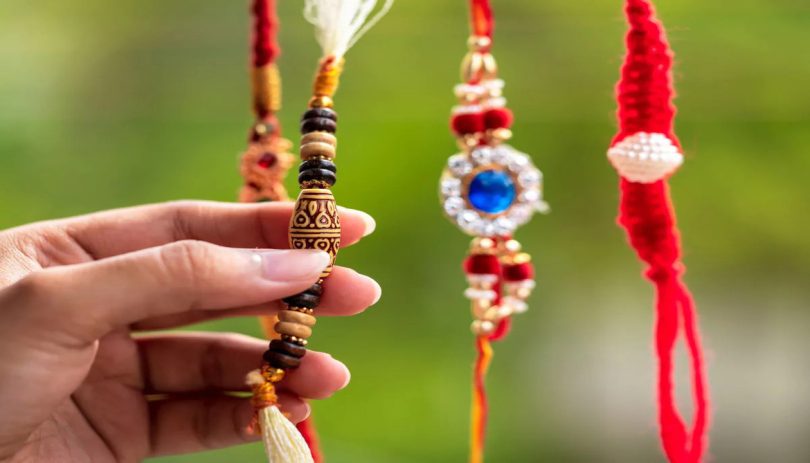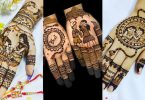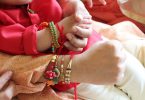Raksha Bandhan is a widely celebrated festival in India that falls in July-August or during the Shravan month, according to the Hindu calendar. It’s a festival that honors the unbreakable bond of brothers and sisters.
Like many other festivals in India, Raksha Bandhan also has some myths and traditional things which people believe. As the festival is around the corner, let’s debunk some Raksha Bandhan myths and discover the realities.
Myth 1: Raksha Bandhan is celebrated only between blood siblings
Raksha Bandhan is celebrated to honor the everlasting bond between brothers and sisters. But many people still believe that siblings must be related by blood to celebrate the occasion, but this is not true.
Raksha Bandhan can be celebrated by tying a rakhi to anyone you see as a brother figure in your life. It can be your best friend who is like a brother to you and always helps you in times of need and stress. Even boys get rakhi from girls who are not their sisters by blood, but they cherish the bond they share with a rakhi and give each other gifts.
Did you know that there’s even a legend associated with this festival that suggests that initially, rakhi was tied to husbands? Yes, in the story of Indra and Indrani, Indrani tied a thread to her husband, Lord Indra, for his protection during the battle against Vritrasura.
Myth 2: Raksha Bandhan is only about brothers and sisters
Many people believe that a rakhi thread is only tied to a brother. Well, traditionally, yes, but since rakhi symbolizes love, protection, and affection, the rakhi tying ritual has changed. Many sisters also tie rakhis to their sisters as a mark of love and respect. It signifies that a brother and sisters can protect and care for each other.
There’s also a unique traditional belonging to Rajasthan, where sisters tie a rakhi to their sister-in-law if their brother is married. The rakhi for a sister-in-law is different from a regular bhai rakhi and is called a lumba rakhi. It comes in traditional to modern styles and is available in many online gift stores, as this trend has become quite popular all over India.
Myth 3: Rakshabandhan is only celebrated by Hindus
Raksha Bandhan is a festival rooted in the Hindu culture and celebrated in the Shravan month of the Hindu calendar. Yes, the festival is celebrated by many Hindus, but it’s limited to this religion. People who follow different faiths and have different cultural backgrounds also celebrate this festival to honor their bond with their siblings. People who also have a friend who is like a sibling to them but of different religion celebrate the day together.
Myth 4: Rakshabandhan is only celebrated in India
Amongst many Raksha Bandhan myths, one that many people believe is that the festival is celebrated only in India. But, many people don’t know that Raksha Bandhan is also celebrated in many other countries, such as Nepal, Canada, USA, UAE, Australia, etc.
Many Indians who moved abroad and are Hindus celebrate the occasion in the same way people do in India by following the same rakhi tying ceremony. Many Indians also organize Raksha Bandhan celebrations in nearby Hindu temples or community centers for mass celebration.
Myth 5: Rakhi should be removed on a specific day and time
There’s also a Raksha Bandhan myth that there’s a specific day to remove the rakhi as there’s an auspicious time to tie a rakhi. But it’s entirely up to you. Removing the rakhi differs according to the different cultures and an individual’s beliefs.
In Maharashtrian culture, people remove the rakhi threads after 15 days of Raksha Bandhan. Some people also remove the rakhi threads on Janmashtami, which falls on the 7th day after Raksha Bandhan.
Myth 6: Raksha Bandhan is only about gift giving
Giving gifts to each other on Raksha Bandhan is a part of the celebration. The festival focuses on the everlasting bond between siblings, even if they are not blood-related. The festival celebrates the one-of-a-kind relationship of brothers and sisters, where they fight with each other, pull silly pranks, and tease each other. But there are times when they come to each other’s rescue, support each other in times of need and never let each other feel alone.
Myth 7: Raksha Bandhan can only be celebrated in person
Raksha Bandhan is usually celebrated with a rakhi thread. A sister ties a rakhi thread around her brother’s wrists and offers him sweets, and gifts are exchanged. But, some siblings move to different parts of the country or abroad due to jobs, studies, or marriage. This doesn’t stop them from celebrating the festival.
Sisters can order and send rakhi to India or even other countries where their brothers are to celebrate the occasion. On the other hand, brothers can send the return rakhi gifts to sisters as their token of love. Many online rakhi stores, such as Rakhibazaar.com, offer free rakhi delivery across India and abroad. Siblings can still virtually celebrate the festival by sending rakhi and rakhi gifts to each other.
Many festivals in India and even other countries have some myths, some of which may be true and some not. In the blog above, we mentioned some myths about Raksha Bandhan and the actual reality. While finding out the realities of the festival, let’s not forget the true essence of Raksha Bandhan. It’s the celebration of love, protection, and affection between siblings.







